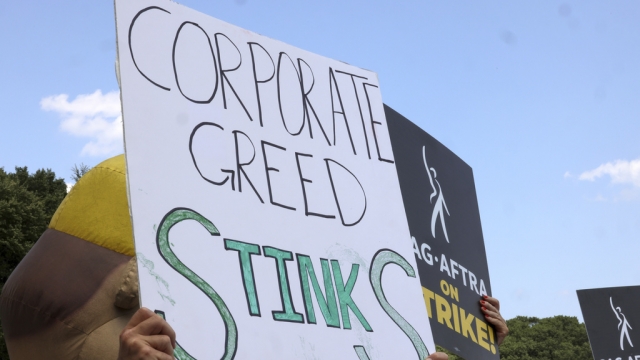Another week, another labor action across America.
In June, workers went on strike at at least 120 Starbucks locations, the company said.
Earlier this month, thousands of hotel workers across southern California walked off the job.
And this week, the writers strike in Hollywood reached its third month. Actors joined them on July 13.
Major strike activity increased by almost fifty percent in 2022, according to the U.S. Labor Department. And the Economic Policy Institute says over 120,000 workers were involved in major work stoppages last year.
What caused the resurgence of the U.S. labor movement?
For one thing, the pandemic accelerated union organizing, reporter Alex Press told "The Response" podcast recently. "We've seen this kind of brief, this sort of early stage uptick in union organizing in this country, very explicitly rooted in our response to a pandemic that was raising the stakes of once again to life or death sort of situations for a lot of frontline workers," she said.
Low unemployment has also given workers more leverage to organize and even strike, says Joseph Brock, president of Reliant Labor Consultants.
"That tight labor market, kind of brought on by COVID, has been a boon for unions," said Brock.
A demographic shift toward workers with more labor-friendly views may also be a factor. "There's a whole generation of younger workers that are discovering unionization as the most reliable way to get better pay and working conditions," Rutgers professor Susan Schurman told Money.com.
Workers cite low pay, bad working conditions, and poor job security as reasons to strike.
But a Milken Institute expert told Yahoo Finance that the Hollywood strike alone could cause $4 billion in losses to the U.S. economy.
"It's not just impacting these industries in California. But it's really doing so in New York, it's doing it in Atlanta. It's doing it in Albuquerque, it's doing it in Pittsburgh. It's doing it in all sorts of places where filming actually takes place," said Kevin Klowden.
What's the outlook for the future?
Unions once played a central role in America's economic, political, and cultural life. But Anthony Carnevale of Georgetown University says unions today face an uphill battle to regain that influence. "They lost their power largely because of globalization, technology, and the decline of manufacturing," he says.
Take the Amazon labor union, as it's called, which won an election with more than 8,000 workers in a Staten Island warehouse last year, a milestone hailed by the press, but the group has not yet reached a collective bargaining agreement.
"The bigger problem for unions will continue to be the attainment of that first collective bargaining agreement," says Brock.
And in terms of politics over the short term, Unions pose both political opportunities and challenges.
Balancing workers needs and growing the economy is proving tough for a president who has aligned himself closely with organized labor.
"Folks, I promised you that I'd be the most pro-union president in American history because I know this: in a crisis, America always counts on you," President Joe Biden told the International Brotherhood of Electrical Workers in a speech last year.
That alignment won him votes from union workers. But now, those close ties could harm a president who has always tried to connect with American workers.
Meanwhile, those marching on the picket line carry on.
SEE MORE: AI fears are fueling the labor strikes in Hollywood
Trending stories at Scrippsnews.com




